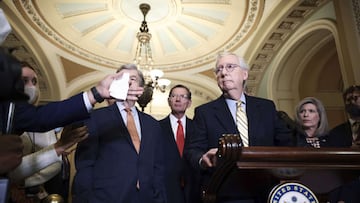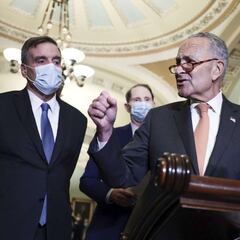Is a government shutdown going to happen at the end of the month?
Congress is currently working to avoid a cliff-edge in federal funding that could see certain non-essential government agencies forced to close temporarily.


As 30 September looms near lawmakers in Congress are scrambling to agree a new legislative package that will ensure that parts of the government are not forced into a shutdown at the end of the month.
Additional funding must be found before that date to ensure that the federal government is able to continue paying its bills, assuming that the Democrats cannot force through a suspension to the debt ceiling in that time.
On Tuesday the House voted to approve a bill that will both fund the government through December and suspend the debt ceiling until the end of 2022, but Democrats will face a much tougher task getting approval from the Senate.
Breaking: House Democrats just passed the Extending Government Funding and Delivering Emergency Assistance Act to provide funding through Dec. 3 to avert a government shutdown and to increase the debt limit.
— Kyle Griffin (@kylegriffin1) September 22, 2021
It was party line vote. 220-211. No Republican votes.
What is a government shutdown?
A government shutdown would occur if the federal government is unable to keep paying for some nonessential offices, typically due to a delay in the approval of a budget for the upcoming fiscal year. Agencies that are essential, such as those relating to the health or general safety of the public, will remain functioning but majority of federal workers may be furloughed or risk going without a paycheck.
Essential government offices not affected by a shutdown include the Drug Enforcement Agency (DEA), the Transportation Security Administration (TSA), Customs and Border Protection (CBP), and the Federal Bureau of Investigation (FBI).
Some organisations may also be able to remain open by relying on cash reserves, but this will only last for a limited amount of time. Public spaces overseen by the government, such as national parks and monuments, will likely be forced to close down temporarily.
What would a government shutdown mean for the US economy?
Each year the federal government’s fiscal calendar runs from 1 October to 30 September, hence the end of month deadline for budget negotiations. A shutdown of even a few weeks can have catastrophic consequences for the national economy and they have become more frequent in recent years, possibly due to an increasingly partisan Congress.
Two shutdowns occurred during the Trump Administration, with the most recent lasting from December 2018 to January 2019. The 35-day government shutdown saw roughly 300,000 federal workers placed on furlough and was the longest of its kind in American history.
This week, the House of Representatives will pass legislation to fund the government through December of this year to avoid a needless government shutdown that would harm American families and our economic recovery before the September 30th deadline.
— Nancy Pelosi (@SpeakerPelosi) September 20, 2021
The economic impact of the break was so severe that the Congressional Budget Office found that gross domestic product fell by 0.1% in the fourth quarter of 2018 and by 0.2% in the final quarter of 2019, costing up to $11 billion.
Related stories
In theory both parties are desperate to avoid a government shutdown but at least one will have to compromise on their current position. The Democrats have passed a funding bill in the House but it includes a provision to raise the debt ceiling, something that the Republicans appear very unlikely to support.
Senate Minority Leader Mitch McConnell is thought to be willing to support a “clean” bill; meaning one free of any policies other than those necessary to avoid the impending shutdown. It remains to be seen which side, if any, will be willing to budge before the end of the month.

